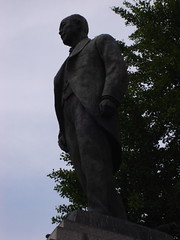A terrible crime was committed in Fukushima, Japan recently:
17-year-old boy turns self in with severed head / High schooler tells police he killed mother
The Yomiuri Shimbun
A 17-year-old high school student was arrested Tuesday on suspicion of killing his mother after turning himself in at a police station in Aizuwakamatsu, Fukushima Prefecture, carrying her severed head, police said.
According to the police, the boy, in his third year at a prefectural high school, came to Aizuwakamatsu Police Station at about 7 a.m. on Tuesday with the head in his school bag. He told the police he had killed his mother at about 1:30 a.m. Tuesday.
The police went to the boy’s apartment in the city, where they found the headless body of the mother.
The boy was quoted by the police as saying: “I killed her by myself at home early Tuesday morning while she was asleep. I wanted to kill somebody, whoever it was.”
Later it was revealed that the boy also sawed off his mother’s arm. After the crime, he went into an Internet cafe, watched a Beastie Boys DVD, and apparently wrote the following note (apparently leaked by police):
I have committed a crime that should never be committed.
–What was your motive?
A reason? Just because.
–Other people won’t be satisfied with that!
Well if I had to say something, I guess it’s a form of self-expression.
–You had no other way to express yourself?
Maybe not.
–Don’t you feel any regret?
Not right now. I feel relieved. But I’m sure I’ll probably regret it later.
–What will you do after this?
I will go have myself charged with the crime.
–Isn’t that a foregone conclusion?
Oh, you might be right. But at the very least there is no crime I desire in reality [Note: this line was a little hard to figure out. The Japanese is reproduced below:]
あーたしかにそうかもしれません。でも現実でだけはボクの望む罪はないと思いますが。
–Do you feel like continuing on?
Not really.
–If you keep going, what will you do next?
I don’t know since I’ve just been acting on my whims.
–Don’t you feel like killing yourself?
No, that would be scary. Plus I promised I wouldn’t kill myself.
–Who did you promise?
I don’t want to say.
–Why not?
Just because.
–Aren’t you being evasive by saying “just because”?
Perhaps. I’ve always been running away like that anyway.
–Any last words?
Thank you for putting up with my nonsense all this time.
(Thanks to the Daily Yomiuri and ZAKZAK)
Comment: This is a sad tragedy that seems to contain similarities to both Columbine (troubled teenager who couldn’t make it through his last year of high school), the Virginia Tech slayings (weapons bought beforehand, a pre-planned media strategy and a clear “self-expression” motive) combined with the all-too-common Japanese mother-son tension. The reports that I’ve seen so far seem to regard this crime as a total aberration by a troubled youth, which it is. But it looks like this sort of thing could be prevented. It’s been reported that it was known that he had been skipping school and a doctor had already diagnosed him as “mentally unstable.” As hard as it is to rein in rebellious teenagers, it’s sad that there wasn’t more done to try and help (or at least medicate) someone with clear mental problems before he became a danger.



 Average cost of a wedding: more than 3 million yen (US$25,000) in 2006. The cost of weddings has been rising since 2003, when the Japanese economy started turning around. (Source: wedding planning site
Average cost of a wedding: more than 3 million yen (US$25,000) in 2006. The cost of weddings has been rising since 2003, when the Japanese economy started turning around. (Source: wedding planning site